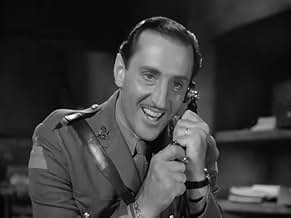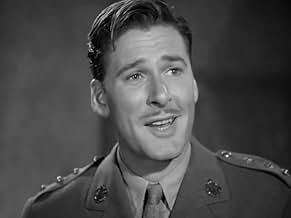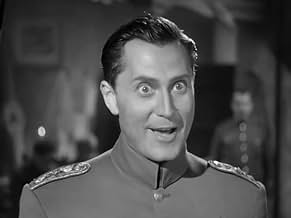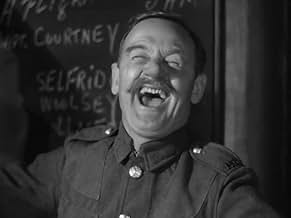IMDb RATING
7.5/10
3.6K
YOUR RATING
British flying aces in World War I contend with the harsh realities of war.British flying aces in World War I contend with the harsh realities of war.British flying aces in World War I contend with the harsh realities of war.
- Awards
- 2 wins total
Sidney Bracey
- Major Brand's Orderly
- (as Sidney Bracy)
Hal Brazeale
- Gregory
- (uncredited)
Tyrone Brereton
- Orderly
- (uncredited)
Richard Deane
- 'B' Flight Replacement
- (uncredited)
Featured reviews
10mlktrout
I first saw this movie when I was 16, and didn't understand a lot of its subtleties; I just thought it was an exciting & dramatic war film with a lot of great flying sequences. I caught it again when I was 34 and was surprised at its depth.
I like to watch this movie whenever my own job gets crazy and hectic, with unrealistic deadlines and insufficient support, because it reminds me that I really don't have it so bad after all. The men in this movie were sent up daily in obsolete equipment in a bad state of disrepair; as the film progressed the squadron had about a 70% turnover as the combat veterans were shot down and replaced by green kids whose limited training could not possibly have prepared them for what they would face.
The characters are all dissected, even lesser, supporting roles receive excellent character studies, and the stars of course are downright fascinating. It's a thrill to learn that Errol Flynn (Captain Courtney) really could act, as well as just jump around and wave a sword; David Niven is wonderfully innocent and almost childlike as "Scotty," and Basil Rathbone, a truly great actor who seldom got the chance to strut his stuff since he was usually typecast as a "bad guy" or as Sherlock Holmes, gives a nerve-wrenching performance as Major Brand, who's floundering under the strain. He proves a profound point -- it is often easier to go to your own death than to order others to do so, a lesson Captain Courtney and Lt. Scott must reluctantly learn as well.
I'm now 44, and have seen this movie a couple dozen times, but it never ages. The flying sequences are still exciting; the chivalry and wild antics of the fliers never becomes tiresome or old, and the anguish of war is still as heartbreaking. Truly a movie that will last.
I like to watch this movie whenever my own job gets crazy and hectic, with unrealistic deadlines and insufficient support, because it reminds me that I really don't have it so bad after all. The men in this movie were sent up daily in obsolete equipment in a bad state of disrepair; as the film progressed the squadron had about a 70% turnover as the combat veterans were shot down and replaced by green kids whose limited training could not possibly have prepared them for what they would face.
The characters are all dissected, even lesser, supporting roles receive excellent character studies, and the stars of course are downright fascinating. It's a thrill to learn that Errol Flynn (Captain Courtney) really could act, as well as just jump around and wave a sword; David Niven is wonderfully innocent and almost childlike as "Scotty," and Basil Rathbone, a truly great actor who seldom got the chance to strut his stuff since he was usually typecast as a "bad guy" or as Sherlock Holmes, gives a nerve-wrenching performance as Major Brand, who's floundering under the strain. He proves a profound point -- it is often easier to go to your own death than to order others to do so, a lesson Captain Courtney and Lt. Scott must reluctantly learn as well.
I'm now 44, and have seen this movie a couple dozen times, but it never ages. The flying sequences are still exciting; the chivalry and wild antics of the fliers never becomes tiresome or old, and the anguish of war is still as heartbreaking. Truly a movie that will last.
I don't have a lot to say about this movie. Errol Flynn is excellent as Captain Courtney, and the rest of the cast is excellent in their roles. That didn't surprise me. What surprised me was two things. First, how the British flying aces in World War I contend with the harsh realities of war, specifically the deaths of their friends and the decisions that had to be made to send more men to their deaths (excellently portrayed by Basil Rathbone as Major Brand). Whats most impressive, however, is how engaging the air sequences were. They were ahead of their time and they hold up rather well today. I just saw Pearl Harbour, and I would say the Dawn Patrol is more exciting. It holds up well today, and if you get a chance, give it a watch. 8 out of 10.
Clear eyed depiction of the cost and dangers for bombers during wartime. Errol Flynn is very good, a reminder that he was excellent not only in period pictures and westerns but quite capable in modern dress dramas. Strong supporting cast helps with Basil Rathbone standing out as a man who understands but is troubled by the weight of his duty even while others do not and is compassionate enough when the that weight has shifted to offer solace. David Niven's star moved much higher with his performance here, it would still be a few years before he moved into the top ranks but he was done with unimportant roles from this point on. Goulding's direction is steady and assured.
This is a stirring and exciting story of the courage shown by pilots who know they or their friends will likely be killed on one of their missions, and the anguish their commanders feel when sending them to their deaths. Set on the battlefields of WWI, the plot duplicates the 1930 version starring Douglass Fairbanks, Jr. In fact, whole sequences (especially flying scenes and the climactic attack) were lifted directly from the earlier film. (Note: although the 1930 version was originally entitled "Flight Command," and is occasionally screened under that title by TCM, IMDb also calls it "Dawn Patrol," probably to distinguish it from the 1940 Robert Taylor "Flight Command" about Navy pilots.)
Although it's a close call, I would recommend this later film over its predecessor, for the superior performances of the lead actors. Errol Flynn (as Dick Courtney) was more involving than 1930's Richard Barthelmess, a veteran actor whose performance retains the somewhat stilted quality of the silent film era. While Douglas Fairbanks Jr. was excellent in the 1930 version as pilot Doug Scott, David Niven in the same role positively sparkles in several more light-hearted, even comedic scenes. And although Neil Hamilton played Major Brand well in the original film, at least early on in the story, the role calls for a less-sympathetic performance, and who could be less sympathetic than Basil Rathbone at his sneery best?
Furthermore, current (as of 2012) releases of 1930's "Flight Command / Dawn Patrol" are not as visually clear in all scenes as the later version, and also have a lot of scratchy sounds and low rumble in the soundtrack, which are especially distracting in quieter scenes. Hopefully, remastered versions of both films will someday be available.
Still, this is only nit-picking, as both the 1930 and 1938 versions of "Dawn Patrol" are excellent. But given the choice, go with Flynn and Niven of 1938.
Although it's a close call, I would recommend this later film over its predecessor, for the superior performances of the lead actors. Errol Flynn (as Dick Courtney) was more involving than 1930's Richard Barthelmess, a veteran actor whose performance retains the somewhat stilted quality of the silent film era. While Douglas Fairbanks Jr. was excellent in the 1930 version as pilot Doug Scott, David Niven in the same role positively sparkles in several more light-hearted, even comedic scenes. And although Neil Hamilton played Major Brand well in the original film, at least early on in the story, the role calls for a less-sympathetic performance, and who could be less sympathetic than Basil Rathbone at his sneery best?
Furthermore, current (as of 2012) releases of 1930's "Flight Command / Dawn Patrol" are not as visually clear in all scenes as the later version, and also have a lot of scratchy sounds and low rumble in the soundtrack, which are especially distracting in quieter scenes. Hopefully, remastered versions of both films will someday be available.
Still, this is only nit-picking, as both the 1930 and 1938 versions of "Dawn Patrol" are excellent. But given the choice, go with Flynn and Niven of 1938.
THE DAWN PATROL, Errol Flynn's final film of his busiest year as an actor (1938), is a fascinating counterpoint to his usual swashbuckling and light comic roles. A remake of Howard Hawks' 1930 classic, this is a tale of war-weary WWI aviators, called upon to risk their lives daily, in broken-down aircraft, on missions they consider impossible (a timeless war theme that would reappear in such WWII classics as COMMAND DECISION and TWELVE O'CLOCK HIGH). Directed by WWI veteran Edmund Goulding, best known for his big-budget romances (GRAND HOTEL), the film counterpoints the gritty, harsh realities on the ground with the nearly surreal quality of early air battles, as bi-planes with open cockpits whirl and swoop like insects, and enemy airmen would occasionally drop out possessions of dead pilots over airfields, in a chivalrous gesture.
Fellow pilots Courtney and Scott (portrayed by real-life friends Flynn and David Niven, again showing the rapport they had demonstrated so effectively in 1936's THE CHARGE OF THE LIGHT BRIGADE) are battle-tested veterans, hell-raising survivors of a squadron decimated by the war. Seeing a constant influx of 'green' kids replacing lost friends, and knowing too well that the rookies' inexperience will quickly cost them their lives, the pair vent their anger against their commander, the coldly 'by-the-book' Maj. Brand (in a remarkable performance by frequent Flynn nemesis, Basil Rathbone). Courtney constantly condemns and belittles Maj. Brand, accusing him of placing 'The Mission' over the lives of the men under his command, which makes Courtney a hero in the eyes of the fliers.
Finally, Brand cracks, and is approved for reassignment, and Courtney is chosen to replace him. In a powerful scene, Brand lets his cold 'facade' down, and reveals, bitterly, to the younger man that seeing his men sent on suicide missions, daily, had literally crushed him. Unknown to the squadron, Brand had constantly begged HQ to ease up, but had been 'shot down' each time, as the missions were essential. "Now it's YOUR turn," Brand sneers, "See how YOU enjoy it!"
Brand's words are prophetic, as Courtney quickly discovers himself in the same situation, as the despised scapegoat, with Scott assuming the role of spokesperson and savior to the squadron. And the most dangerous mission yet has just come down from HQ...
DAWN PATROL is a powerful film, with great performances from the entire cast, particularly Flynn, who had often begged the WB to give him roles beyond his 'swashbuckler' image. The critical praise it garnered proved Flynn's versatility as an actor (although public demand would keep him 'locked' into adventure films), and raised David Niven up to 'star' status.
It remains one of the BEST films about the 'Great War', and shouldn't be missed!
Fellow pilots Courtney and Scott (portrayed by real-life friends Flynn and David Niven, again showing the rapport they had demonstrated so effectively in 1936's THE CHARGE OF THE LIGHT BRIGADE) are battle-tested veterans, hell-raising survivors of a squadron decimated by the war. Seeing a constant influx of 'green' kids replacing lost friends, and knowing too well that the rookies' inexperience will quickly cost them their lives, the pair vent their anger against their commander, the coldly 'by-the-book' Maj. Brand (in a remarkable performance by frequent Flynn nemesis, Basil Rathbone). Courtney constantly condemns and belittles Maj. Brand, accusing him of placing 'The Mission' over the lives of the men under his command, which makes Courtney a hero in the eyes of the fliers.
Finally, Brand cracks, and is approved for reassignment, and Courtney is chosen to replace him. In a powerful scene, Brand lets his cold 'facade' down, and reveals, bitterly, to the younger man that seeing his men sent on suicide missions, daily, had literally crushed him. Unknown to the squadron, Brand had constantly begged HQ to ease up, but had been 'shot down' each time, as the missions were essential. "Now it's YOUR turn," Brand sneers, "See how YOU enjoy it!"
Brand's words are prophetic, as Courtney quickly discovers himself in the same situation, as the despised scapegoat, with Scott assuming the role of spokesperson and savior to the squadron. And the most dangerous mission yet has just come down from HQ...
DAWN PATROL is a powerful film, with great performances from the entire cast, particularly Flynn, who had often begged the WB to give him roles beyond his 'swashbuckler' image. The critical praise it garnered proved Flynn's versatility as an actor (although public demand would keep him 'locked' into adventure films), and raised David Niven up to 'star' status.
It remains one of the BEST films about the 'Great War', and shouldn't be missed!
Did you know
- TriviaAt the time this movie was filmed, Errol Flynn and David Niven shared a rented house at Malibu, which they named "Cirrhosis-by-the-Sea" because of all the hard drinking and sex they were having with several women.
- GoofsThe amount of oil and dirt on Courtney's face changes several times between scenes. The most obvious is when he goes up stairs to console another pilot who has lost a friend. As he goes up his face is slightly dirty, as he enters the room it is noticeably dirtier and when he comes back down it is much cleaner.
- Quotes
Phipps: [Opens package dropped by enemy plane] It's his helmet and goggles. It means a very gallant gentleman died this afternoon. And for what? What have all these deaths accomplished? So many fine chaps have died in this war and are going to die in future wars.
[pause]
Phipps: That's all, gentlemen.
- ConnectionsFeatured in Effets spéciaux du cinéma (1996)
- SoundtracksPoor Butterfly
(1916) (uncredited)
Music by Raymond Hubbell
Lyrics by John Golden
Played on the Grammaphone
- How long is The Dawn Patrol?Powered by Alexa
Details
- Runtime1 hour 43 minutes
- Color
- Sound mix
- Aspect ratio
- 1.37 : 1
Contribute to this page
Suggest an edit or add missing content

Top Gap
By what name was La patrouille de l'aube (1938) officially released in India in English?
Answer

































